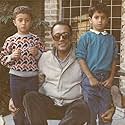Comprised mostly of interviews of 6-year-old kids who've had problems getting their homework done at a public school in Tehran, patterns begin emerging that form the basis for a criticism of the education system in Iran in 1989. At the heart of it is learning by rote, with a sizable percentage of parents, illiterate themselves, ill-equipped to help their children at home. The kids painfully know what corporal punishment is, most often in the form of a parent hitting them with a belt, but few ever having received a reward or encouragement. They chant invectives against Iraq and Saddam Hussein, just a year removed from the eight year war that killed hundreds of thousands of people, and they chant religious dogma lauding Ali and their Shi'ite faith. At one point an adult is interviewed, and he comments that creativity and critical reasoning should be fostered, comparing the state of affairs in Iran to other countries, and fearing for the future.
It's certainly sad to see these little faces reveal their lives to Kiarostami's simple questions, and the film is not short on emotional power. On the downside, I didn't much care for the frequent cuts back to the cameraman focusing on the kids, even if the intent of this(?) was to remind viewers of the power dynamic, and why kids would be lying by saying they preferred homework to cartoons; regardless, it seemed overdone to me. I also didn't like the cruelty Kiarostami showed to the last child, who was absolutely terrified of being interviewed alone, and yet got badgered with questions. This was undoubtedly left in the film to show how traumatized and fragile a child could be in this system; his troubles apparently stemming back to having been beaten by a teacher with a ruler so hard that it broke. He only snaps out of his anxiety when asked to sing a religious song, which he then belts out with confidence, which was an ominous warning of what the system was producing. It's a brilliant moment, but the ends didn't justify the means, and I was left conflicted by what I had seen. It's a documentary worth seeing though, and I wish we could see how these kids, now nearing 40, turned out.















